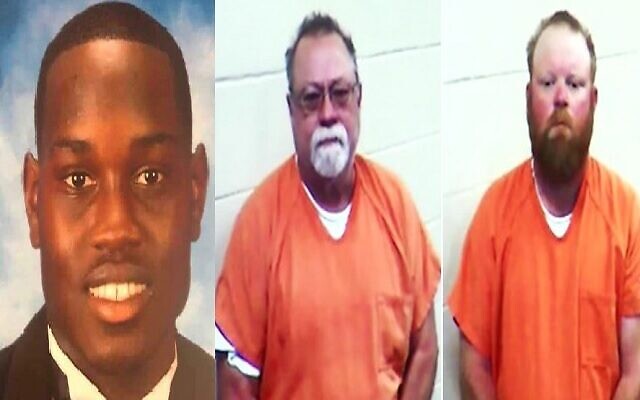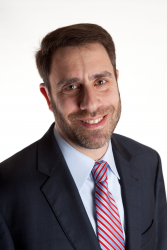Former Atlanta Rabbi Wasn’t Prepared for Brunswick Killing
Rabbi Rachel M. Bregman, a former rabbi of The Temple in Atlanta, a self-described ‘social justice junkie’ is heartbroken about the alleged racial shooting in Brunswick.

When Rabbi Rachel M. Bregman first learned about the recently released video of the shooting of a 25-year-old African American jogger in Brunswick, Ga., she told the AJT that she wasn’t prepared.
“How can you be? I am really heartbroken to be joining a small, but growing club of clergy and community leaders where a young black person is murdered for being a young black person,” the Brunswick rabbi said about the February incident that resulted in three arrests, but is still under investigation.
Bregman, formerly at The Temple in Atlanta, is the rabbi at Brunswick’s only synagogue.
Given Bregman’s background, one might have assumed that her whole life might have prepared her to be where she is, at this significant juncture in time. She calls it “divine intervention” that after three years at The Temple in Atlanta, she found her calling in Brunswick, where she has led the Jewish community in the area for seven years.

Bregman is part-time rabbi of Temple Beth Tefilloh, but another part of her job is to be active in the wider community of Glynn County.
The young single mother now finds herself amid a community crisis that has attracted worldwide attention. On Feb. 23, Ahmaud Arbery was shot and killed apparently while jogging down a Brunswick Street. A half-minute video of the shooting was released earlier this month, after which a father and son were arrested and charged with murder and aggravated assault. A week later, William “Roddie” Bryan Jr., the man who recorded the fatal shooting of Arbery, was arrested on charges including felony murder, according to the Georgia Bureau of Investigation.
“I have always been a social justice junkie,” Bregman, a Boston native said, describing herself. She noted how she ran a soup kitchen while in rabbinic school in New York and traveled to Rwanda and Uganda to “better understand the complexities of the world.” As a community organizer, she’s also been heavily involved in hunger, homelessness, anti-human trafficking and civil rights.
All of which may have led her to The Temple in the first place. “Knowing The Temple embraced a commitment to social justice” acted as a magnet to Bregman. The oldest Jewish congregation in Atlanta, established in 1860, The Temple has long been in the center of the civil rights movement. In 1958, The Temple was bombed by white supremacists in retaliation for Rabbi Jacob Rothschild’s criticism of segregation.
While at The Temple, Bregman served as the rabbi for Open Jewish Project, connecting with thousands of young Jewish adults, and strove to educate the Atlanta Jewish community about the scourge of human trafficking.

“Rabbi Rachel Bregman left an extraordinary legacy at The Temple,” Senior Rabbi Peter Berg told the AJT. “Relationship-building is at the core of her rabbinate. When there is a crisis, as there now is in Brunswick, a rabbi who understands the value of building strong relationships is in the position to make the biggest difference. Brunwick needs Rabbi Bregman now, more than ever before. They are so fortunate to count her as one of their most inspiring leaders.”
According to Bregman, there are two parts to this tragedy. One is police corruption, because there are concerns of a police cover-up. Two, is racism. “The global attention to the story may help end the corruption,” said Bregman, “but the police corruption seems easier to root out than the racism.”
Bregman describes the southeastern Georgia area as “magic. I fell in love with it,” she said of her initial impressions when she was looking for her next rabbinic step after The Temple. “The people at the congregation are great. The hospitality is amazing, and I live by the ocean.” She talks about the Spanish moss draping the oak trees and the birds singing brightly.
But she also notes that despite a pluralistic sense of community, there’s segregation based on color, social economic status and whether one lives on the mainland or one of the islands in the area.
Temple Beth Tefilloh was established in 1886 and serves as the center of the Jewish community in the area. Bregman said most of her 45 family-member congregants live on St. Simons Island, followed by Brunswick and Jekyll Island. “Everyone here is mad, sad and scared,” she said. “I think that as the story is evolving, there’s a sense of anger and hope that things will change.”
She noted the rise in white supremacy in the area but pointed out that anxiety in the Jewish community climbed after the white supremacist and neo-Nazi rally in Charlottesville, Va., in August 2017. “A bunch of progressive clergy members and I wrote a letter to the local newspaper, saying that there is no place for this here. Everyone signed it. There was an outpouring of support for the Jewish community.”
A little over a year later, after the massacre in the Tree of Life synagogue in Pittsburgh, Pa., the community held a huge vigil in the synagogue. A police officer for the next-door high school came over to guard the synagogue door. “We didn’t ask him to do that. A lot of people are standing up.”
As Bregman talks about the developing story behind the murder of Arbery, she underlines his name. “I want to repeat his name,” she said, noting that the first local story of the shooting just left it out.
When a tragedy like this occurs, Bregman added, “it takes a minute to figure out what to do. We are shocked, appalled, upset, and we want to respond in a helpful and appropriate way.” One way, she suggests, is to donate to the Arbery Scholarship Fund, https://www.coastalgacaa.org/give.html.



comments